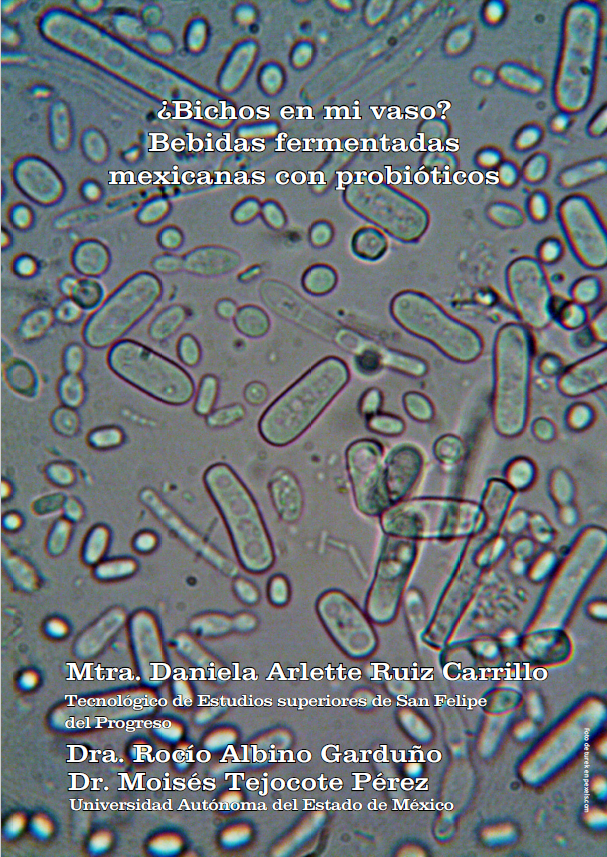¿Bichos en mi vaso? Bebidas fermentadas mexicanas con probióticos
Abstract
Fermented beverages are products that contain probiotic microorganisms and essential, easily assimilable nutritional compounds available at a low cost. However, knowledge about the microbiological composition of fermented beverages is often insufficient, leading to a disregard for traditional Mexican gastronomy. The objective of this review is to present the beneficial properties associated with the probiotics that come with the consumption of fermented beverages in the daily diet. In this work, we seek to highlight the positive properties attributed to these beverages with the purpose of promoting their appreciation and consumption.
Downloads
References
Avilés-Peraza, G.C. (2015) ‘Balché (Lonchocarpus longistylus): árbol mágico, usos ceremoniales y medicinales’, Desde el Herbolario CICY, 7, pp. 46–48.
Burini, J.A. et al. (2021) ‘Levaduras no convencionales como herramientas de innovación y diferenciación en la producción de cerveza’, Revista Argentina de Microbiología, 53(4), pp. 359–377.
Camacho Vera, J.H. et al. (2019) ‘Los alimentos artesanales y la modernidad alimentaria’, Estudios sociales. Revista de alimentación contemporánea y desarrollo regional, 29(53).
Camarena-Alvarado, I. et al. (2022) ‘Probióticos como suplemento alimenticio y su efecto en enfermedades gastrointestinales’, Acta de Ciencia en Salud, (16), pp. 27–37.
Escalante, A. et al. (2016) ‘Pulque, a traditional Mexican alcoholic fermented beverage: historical, microbiological, and technical aspects’, Frontiers in microbiology, 7, p. 1026.
Fajardo-Argoti, I.-C., Jurado-Gámez, H.-A. And Parra-Suescún, J.-E. (2022) ‘Viabilidad probiótica y capacidad de inhibición de L. gasseri microencapsulada en L. monocytogenes y S. aureus’, Biotecnología en el Sector Agropecuario y Agroindustrial, 20(2), pp. 87–101.
Gan, J. et al. (2023) ‘Effect of fermentation using different lactic acid bacteria strains on the nutrient components and mineral bioavailability of soybean yogurt alternative’, Frontiers in Nutrition, 10.
Gutiérrez-Sarmiento, W. et al. (2022) ‘Microbial community structure, physicochemical characteristics and predictive functionalities of the Mexican tepache fermented beverage’, Microbiological Research, 260, p. 127045.
Martínez-Cervantes, M. et al. (2019) ‘Valor Funcional de Bebidas Tradicionales Con Posible Potencial Prebiótico’, Revista Científica de la Universidad Autónoma de Coahuila, 11(22).
Méndez Hernández, L. (2020) ‘Determinación De Los Parámetros De Etanol En El Proceso De Fermentación Y Destilación Para La Producción Artesanal De Pox Con Sabor’.
Negrete-Romero, B. et al. (2021) ‘Nutritional contributions and health associations of traditional fermented foods’, Fermentation, 7(4), p. 289.
Ojeda-Linares, C.I., Vallejo, M. and Casas, A. (2023) ‘Disappearance and survival of fermented beverages in the biosphere reserve Tehuacán-Cuicatlán, Mexico: The cases of Tolonche and Lapo’, Frontiers in Sustainable Food Systems, 6, p. 1067598.
Ozen, M. and Dinleyici, E. (2015) ‘The history of probiotics: the untold story’, Beneficial microbes, 6(2), pp. 159–165.
Parascanu, M.M. et al. (2021) ‘Environmental and economic analysis of bioethanol production from sugarcane molasses and agave juice’, Environmental Science and Pollution Research, 28, pp. 64374–64393.
Ramírez-Guzmán, K.N. et al. (2019) ‘Traditional fermented beverages in Mexico’, in Fermented beverages. Elsevier, pp. 605–635.
Rawat, M. et al. (2023) ‘A comprehensive review on nutraceutical potential of underutilized cereals and cereal-based products’, Journal of Agriculture and Food Research, p. 100619.
Rubio-Castillo, Á.E. et al. (2021) ‘Tejuino, a Traditional Fermented Beverage: Composition, Safety Quality, and Microbial Identification’, Foods, 10(10), p. 2446.
Rubio-Castillo, Á.E. et al. (2022) ‘Gut metabolites produced during in vitro colonic fermentation of the indigestible fraction of a maize-based traditional Mexican fermented beverage, Tejuino’, Food Chemistry: Molecular Sciences, 5, p. 100150.
Scarpa, G.F. and Pacor, P. (2017) ‘¿Por qué ya no recolectan los recolectores?: Procesos de estigmatización del consumo de plantas silvestres entre los indígenas chorote del Chaco salteño’, Runa, 38(1), pp. 05–21.
Tamang, J.P. et al. (2020) ‘Fermented foods in a global age: East meets West’, Comprehensive Reviews in Food Science and Food Safety, 19(1), pp. 184–217.
Väkeväinen, K. et al. (2020) ‘Effect of different starter cultures on the sensory properties and microbiological quality of Atole agrio, a fermented maize product’, Food Control, 109, p. 106907.
Velázquez-López, A. et al. (2018) ‘Bebida fermentada elaborada con bacterias ácido lácticas aisladas del pozol tradicional chiapaneco’, CienciaUAT, 13(1), pp. 165–178.
Viroli, S.L.M. et al. (2021) ‘Production and characterization of acetic fermentation with different fruit peels’, Research, Society and Development, 10(14), pp. e84101421878–e84101421878.






